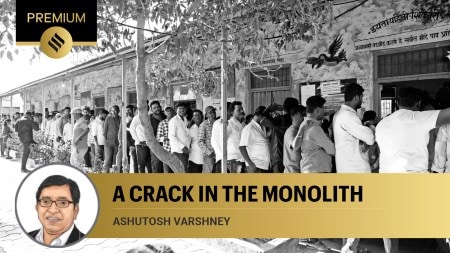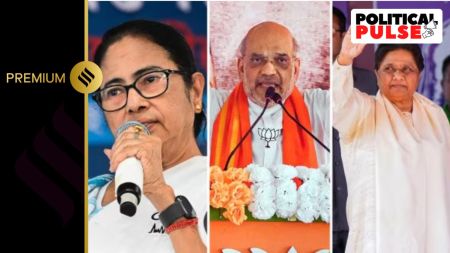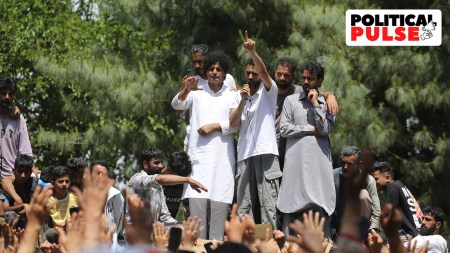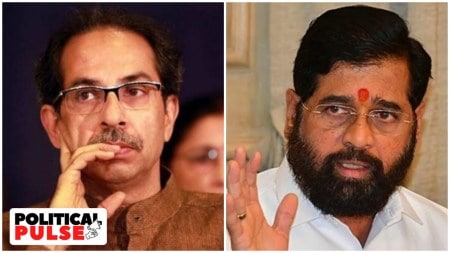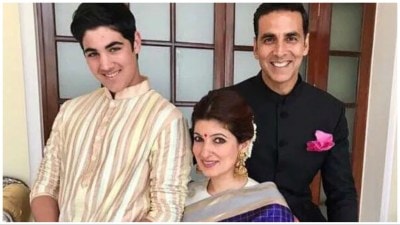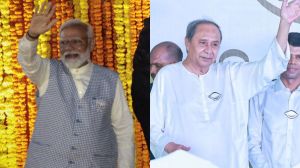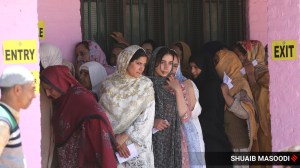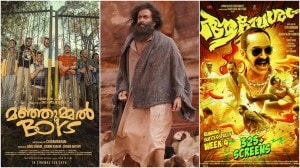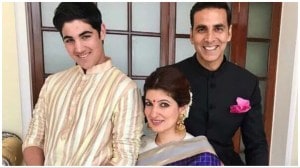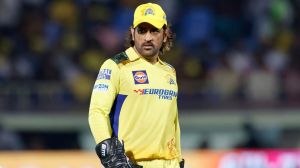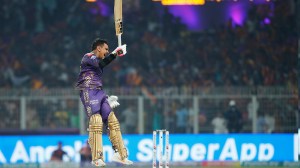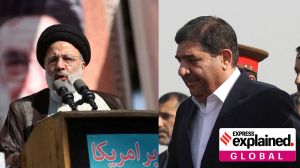- India
- International
Bhagwat praises Ambedkar: How the RSS came to embrace the father of India’s constitution
RSS sarsanghchalak Mohan Bhagwat on Tuesday asked his audience to read B R Ambedkar’s last two speeches in the Constituent Assembly. The RSS was initially critical of Ambedkar --- what changed, and how?
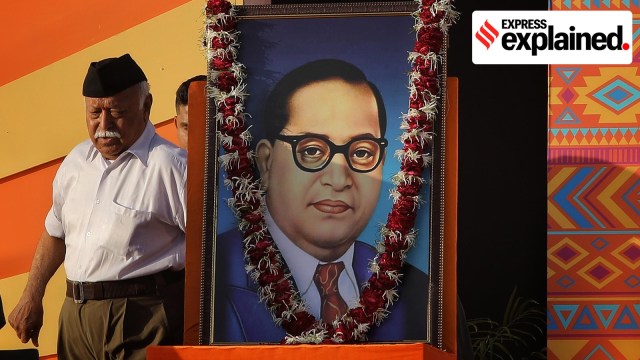 RSS chief Mohan Bhagwat pay respect to Dr B R Ambedkar during RSS "Samaj Shakti Sangam" at GMDC ground in Ahmedabad in April 2023. (Express photo by Nirmal Harindran)
RSS chief Mohan Bhagwat pay respect to Dr B R Ambedkar during RSS "Samaj Shakti Sangam" at GMDC ground in Ahmedabad in April 2023. (Express photo by Nirmal Harindran) In his annual Vijayadashmi address, RSS sarsanghchalak Mohan Bhagwat on Tuesday (October 24) urged his audience to read B R Ambedkar’s last two speeches in the Constituent Assembly in the same way as they read K B Hedgewar, the founder of the RSS.
Bhagwat’s invoking of Ambedkar is in line with the RSS’s years-old practice of praising Babasaheb. In recent years, especially since the BJP came to power at the Centre in 2014, the Sangh has sought to aggressively co-opt the legacy of Ambedkar.
How does the exclusivist Hindu nationalism of the RSS square with the republican ideals of the man who walked out of the Hindu fold to embrace Buddhism? How has the RSS position on Ambedkar evolved over the years? We take a look.
The RSS’s initial criticism of Ambedkar
When Ambedkar was finalising the Indian Constitution and advocating reform of Hindu personal laws, the Sangh and its English-language journal Organiser attacked him and his work, historian Ramachandra Guha wrote in his article, ‘Which Ambedkar?’, in The Indian Express in 2016.
Guha recalled that the Organiser issue for November 30, 1949, carried an editorial on the Constitution, whose final draft had just been presented to the Constituent Assembly by Ambedkar.

“The worst [thing] about the new Constitution of Bharat,” the editorial said, “is that there is nothing Bharatiya about it… [T]here is no trace of ancient Bharatiya constitutional laws, institutions, nomenclature and phraseology in it”.
The Sangh opposed the passage of the Hindu Code Bill that sought to give Hindu women the right to marry outside their caste, divorce their husband, and inherit property. In 1949, the RSS organised hundreds of meetings and protests across India to stop the bill, where sadhus and sants came to speak, Guha wrote.
This was to change subsequently.
Since its formation in 1925, the RSS has always spoken about ‘Hindu unity’, but its leadership has been criticised for being dominated by upper castes in general and Brahmins in particular. Two incidents were seen as a setback to the RSS’s attempt to “unite Hindus”.
One was the large-scale conversion of Dalits led by Ambedkar. On Vijayadashami in 1956, on the same day as the RSS sarsanghchalak delivered his annual address to swayamsewaks in Nagpur’s Reshambagh, at Deekshabhoomi in another part of the city, Ambedkar embraced Buddhism along with nearly half a million followers.
But it wasn’t until the Meenakshipuram incident of 1981, when hundreds of lower-caste Hindus in Tirunelveli district of Tamil Nadu converted to Islam, that the RSS began invoking Ambedkar and Dalits.
After the incident, a shaken RSS began organising Hindu Samagams or gatherings across the country. One such event was held in 1982 in Bangalore, where thousands of uniformed swayamsewaks are said to have declared, “Hindavah sahodarah sarve (All Hindus are brothers).”
At a function in Maharashtra on April 14, 1983, the RSS marked the birthday of both Ambedkar and Hedgewar — that year, Ambedkar’s birth anniversary by the Roman calendar had coincided with Hedgewar’s by the Hindu calendar. The RSS then built on that symbolism by taking out a 45-day Phule-Ambedkar yatra that covered the whole of Maharashtra.
In 1989, the centenary year of Hedgewar’s birth, every RSS shakha was asked to run at least one education centre in Dalit localities in its area. Balasaheb Deoras as sarsanghchalak and H V Sheshadri as sarkaryawah were behind this strategy. This was followed by the establishment of sewa vibhags in the RSS to organise such activities.
In 1990, the RSS marked the centenary year of Ambedkar and Dalit reformer Jyotiba Phule. The Akhil Bhartiya Pratinidhi Sabha (ABPS), the highest decision-making body of the RSS, passed a resolution on the occasion that read: “These two great leaders dealt deadly blows to the evil practices and conventions prevailing in Hindu society, and… successfully persuaded Hindu society to do away with all the injustices it had perpetrated on its own members.”
In 2015, Bhagwat ended his Vijayadashami address with the slogan, ‘Hindu Hindu ek rahen, bhedbhao ko nahi sahen (All Hindus must be one, discrimination must not be tolerated)’.
The next year, the Organiser put Ambedkar’s picture on the cover and published a bunch of articles praising him and his work.
More Explained
Must Read
EXPRESS OPINION
May 20: Latest News
- 01
- 02
- 03
- 04
- 05



